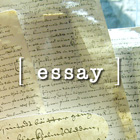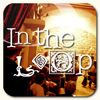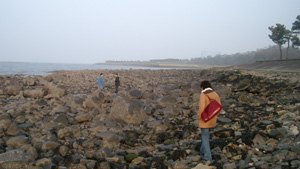
|
|||||||
WHY INDIVIDUALS WANT TO BENEFIT FROM ONE ANOTHER'S KNOWLEDGE 23 February 2006 People want to believe what their friends, neighbors, teachers, political representatives tell them. They will express skepticism, and they will be brash and indignant about public scandals or about dubious claims, but ultimately, they err on the side of credulity. The civil actor, the human being in society, is able, as a tool of standard use, to suspend disbelief and participate in sometimes elaborate fantasies, in the interests of sustaining the feeling of belonging to a broad human undertaking. Some would point to situations where totalitarianism slowly rises from a free society, where an entire population gets into trouble politically by first handing over certain liberties, because perhaps they are afraid to voice dissent, afraid to be labeled unpatriotic or to be seen as going against the grain. Some would say this is the driving factor for a population's excessive credulity in the face of what might otherwise seem to be obvious lies, and that its basis is one of selfishness and social darwinism. But there must be more nuance to it than that, and I suspect this nuance would take us away from the political intimidation motive altogether. This is because such situations, where collective conversation and public debate become fear-based echo-chambers, really arise only after people have made willing choices to speed the conversation along those lines, willing though perhaps unconscious, but not necessarily driven by fear. One of the important factors in the development of human societies and civilization as we know it is —beyond the human intellect, certainly our most powerful single tool— the tendency to construct and to draw from a collective reservoir of intellect and study. I don't mean necessarily academia or trailblazing science, but rather the tendency of human beings, through language, culture and conversation, to share and to pass along, to communicate, information that enriches the overall pool of experience. By successful communication of true observations and ideas, the individual intellect gains knowledge and experience of a scope it could not achieve through individual lived experience alone. This process accelerates and broadens the overall picture of the universe we inhabit, as understood by us. Through language and its many uses, political, academic and personal, we mount a collective study of the universe and so build a more complex, more readily confirmed picture of the "reality" of so many details we must face from day to day. The idea, the mechanism for this process, may be part of our instinct as a species, rooted in the physical and intellectual expressions of our biological heritage, and expounded by our ability to reason and to synthesize disparate pieces of information. All these tasks are in a sense made possible, not only brought to us, but performed in our environment by way of this fabric of observation, language, thought and storytelling. Whether it's reporting, academic study, government investigation, literature or oral conveyance, the passing of information through language is the telling of a story whose end is the enrichment of the base of experience an individual can access in order to make judgements about the world. Given that most healthy human beings understand this process implicitly, perhaps without ever giving it serious personal thought, there is a motivation inherent in the social linguistic being to believe that what information is passed along through this fabric is true. Credulity means the furtherance of the belief that our understanding —and so our security and wellbeing— is expanded as our collective knowledge-base grows and is acquired and updated within the individual mind. Perhaps on some instinctual level, harkening back to an age when human beings lived essentially in the wild and found themselves to be prey, and had to know what would help them survive being hunted, a survival instinct comes into play, so that yes, there is fear involved. But essentially, the human intellect has evolved to the point where it is more akin to experimenting with the very fabric of ourselves to engage in communication and expansion of the intellect through acquired knowledge. We as grammarian apes are motivated by the urge to add to and to expand our store of experience, as other species store food. So it may be that fear is less the motivator than the basic will to know more, to be more involved in the landscape of human experience, to be more with the world than if we weren't acquiring sound information. In fact, as we fit into a comfortable social niche, come to know and to help build and maintain a given community or social group, one of the great benefits of the trust that develops is the sense that one need not experience fear of mis-stepping, let alone of sabotage or extinction. There is a basic human tendency, even among the anti-academic and the counter-intellectual point of view, to value the acquisition of information as a means of being better secured against decline and better able to comprehend problems, to solve them and to survive. Trust in our chosen sources of information allows us to assimilate and to synthesize information we are drawn to or require, and in the best case, to compare and contrast overall sets of information and discard that which is useless or unlikely to be true. So perhaps it can be said there is a "credulity instinct", something that due to our peculiar intellectual experiment as a species, our collective study —even at informal, private levels— of the universe affords us the opportunity to willingly adopt the ideas and the descriptions of others. This then being the only way we have to adequately broaden our comprehension of a world we have not time to fully know and experience in all its material complexities. The human being is a talkative, rhetorical animal that likes to have things to argue about, situations and ideas to compare and contrast, fodder for often pointless debate. We have industries and professions devoted to perpetuating and expanding this process, to documenting it and relaying it to those who do not participate directly. Democratic societies have opted for a system of government based on talking and communication, the re-presentation of ideas, points of view and desires, pooled together in a collective experiment at refinement and improvement, for the benefit of all. In fact, that process is in a way modeled on the individual's experience of living in society, having to look to others, to cooperate, to ascertain the veracity or reliability of truth-claims, to know the witnesses for and against. And credulity in the political realm, as much as in the personal, may simply seem on the gut level, a preferable course to endless, agonizing doubt, self-doubt and skepticism. This is why the truthfulness of reports, especially from widely used or official sources, is so vital. There is a fundamental trust underlying all social undertakings, which stems from the basic understanding that the willingness to offer one's credulity to a group is meant to be answered with truthful and not insincere renderings of the facts of the world. But the possible existence of a credulity instinct does not justify irrational commitment to blind faith in any given leaders or points of view. Precisely because there is a tendency of social beings to want to adopt more widely held ideas, there is a fundamental ethical requirement that all individuals take note of this tendency in themselves and strive to review their beliefs and the information they receive with a critical eye, with an eye to actually gaining sound knowledge. Otherwise, the whole collective experiment of seeking to know the universe by way of the human intellect and spirit will be slowed, muddied and many who rely on it in the wrong places will come to grief. If it is human to want to believe, it is also human to make the effort to know that one has not subscribed thoughtlessly to a false account. [s] © 2006 Joseph Robertson |
|||||||
|
|||||||








